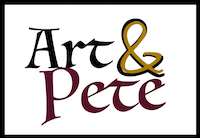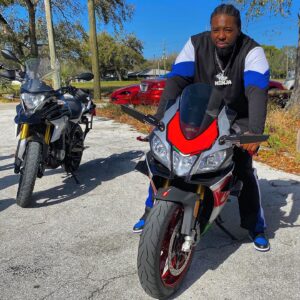
NEW YORK, NEW YORK – OCTOBER 01: Musician Robbie Robertson attends a Town Hall with SiriusXM Insight host John Fugelsang at SiriusXM Studios on October 01, 2019 in New York City. (Photo by Astrid Stawiarz/Getty Images for SiriusXM)
Getty Images for SiruisXM
Talking about his heritage and early days in music, Rock And Roll Hall Of Fame legend Robbie Robertson quips, “I’m one of a kind. There are no Canadians in Southern rock and roll bands. It’s almost against the law. I was also half-Jewish and half-American Indian , that should disqualify you right off the bat too. So all these limitations, all these walls I was up against I had to break them down.”
Break them down he did, becoming, as he puts it, “Part of a musical revolution.” From playing with the Band to touring with Bob Dylan, from collaborating with Peter Gabriel and Bono to Martin Scorese, Robertson has remained a vibrant and compelling force in music.
Right now is a perfect example as Robertson has a stunning new album, Sinematic, his work with Scorese scoring the highly anticipated The Irishman and a brilliant new documentary on the Band, Once Were Brothers.
I sat down with Robertson at the iconic Village Studios in L.A. for a conversation that was more a music history lesson than an interview. This is Robbie Robertson on being in Woodstock, playing with Dylan, his friendship with Van Morrison, working with Scorese and more.
Steve Baltin: You have always been around part of a community of musicians. Did that all start for you going to the south when you were 16?
Robbie Robertson: That’s always been the case. Music makers love one another and also realize that we’re up against one another in a creative way. We came from a place where we spent many years gathering, going from the “Chitlin Circuit” in the south all the way up to Canada and gathering musicalities and seeing amazing people that nobody had ever heard of that were extraordinary. And we kept gathering and putting all of these elements in our arsenal and seeing top-notch rock and roll bands too. Then through crazy circumstance we end up hooking up with Bob Dylan, somebody who comes from another world from us. And, to me, a very interesting world and a very interesting crossroads that he was at. So it was a question of whether these elements would fit together. But we joined up with something that turned into a historic musical revolution. It was unimaginable what happened when we joined Bob Dylan and played all over North America, Australia and Europe and people booed us every night. And we didn’t blink. We kept playing and we played as if the world was wrong and we were right. That’s very, very hard to do. And if you weren’t doing it with somebody that knew how to break the rules as good as anybody in the history of music you just wouldn’t go near it. And we did it and when we got together again eight years later we didn’t change a thing and everybody joined and cheered this on. And it was a feeling to think, “They changed, we didn’t change. The world was wrong and we were right.” That’s quite a feeling of coming through the revolution and finding out that you could win in this musical revolution. But the point I was leading to was we then went into a place of isolation. We were only around Bob Dylan, we weren’t around a community of musicians. We went into the mountains in isolation in Woodstock. There was nobody in Woodstock except us. It changed years later but in the beginning it was just us. And we went into a pink house out in the middle of a hundred acres in the middle of nowhere outside of Woodstock and made music that had an influence on the course of the culture and to music that was astounding to us because we had no idea that this was where it was going.
Baltin: Can you see now why the music struck such a chord and had so much influence?
Robertson: In honesty, we had no idea, because we didn’t know what was trendy. We were living in our own dimension musically and we were trying to bring all of these elements together in our music in the most honest way we possibly could. And that was it. That was all we had to go on. And when we made this record and it came out and it had this effect on music, and even on the way musicians looked, we were like, “What’s going on?” And at some point you think, “Wait a minute, are they stealing my s**t? Don’t start looking like me.” This, to us, wasn’t a look. This was just the way that we dressed every day. It had nothing to do with trendiness and we had never ever uttered the words, “Let’s do something different.”
Baltin: Does seeing everything through the perspective of Once Were Brothers allow you to have a better understanding of what happened?
Robertson: I have to give a lot of credit, to which this film really displays in a very emotional way this brotherhood. I would put this relationship, this story, this experience in music up against any group in history. And nobody in this group ever thought about, “You know what? We want to be a famous pop star or anything.” That never had anything to do with it. This was from the music, from the ground up. And all we wanted to do was express this musicality and I wanted to write these stories. I wanted to take you into a movie of music and that’s what we were able to do. And that’s what truly separated us from the pack. So, in this movie, going back and paying respect to that brotherhood, is an honor.
Baltin: In the song “Once Were Brothers,” you sing, “Once were brothers/Now the connection is lost.” Can the connection ever truly be lost?
Robertson: The music is never lost and the brotherhood is never lost, but you do change and grow and things evolve. And what we were for a long time, that we were just back to back, in a group called the Band because this wasn’t a singer and a guitar player and some other guys. This was a group that all five people played such a pivotal part in and were so unique in their own way. There’s never been a group like this. And so I have such gratitude and I feel so fortunate to have been a part of something like that and that we were able to do what we were able to do. And this was during a period, in the late ’60s and the ’70s, it was a crazy time. And there was a lot of experimenting with drugs, there was a lot of seeing how close to the edge you could ride without going over. And everybody was in this, everybody that we knew. I didn’t know anybody who wasn’t on the same wavelength of living this kind of dangerous…now when you look at it you think, “Oh my god, that was kind of crazy and dangerous and foolish.” But when you’re in it, cause everybody else is like that too, you think, “This must be okay.”
Baltin: Do you have a greater appreciation now over time for all that you accomplished?
Robertson: I never had to get a deeper appreciation. It’s built into me and I have such a love for these guys and what we were together. And I have many other things to do, and other fish to fry as they say. But, for any moment there is no taking away from this beautiful experience that we had together. I have nothing but love and respect in my heart for this brotherhood.
Baltin: Is there a recurring theme you hear in Sinematic?
Robertson: I didn’t know all these pieces were fitting together the way they were until it started happening so much that I wanted to celebrate it. I wanted to say, “This is a wonderful thing that I’m writing music for The Irishman, and it’s seeping in here.” The music from the documentary Once Were Brothers is from the song “Once Were Brothers” on the record, that’s seeping in there. I was putting together the fiftieth anniversary of the Band album and the story of the Band and experiences from that starts to seep in. And then The Irishman is a fierce mob movie and it’s unlike any mob movie that I’ve ever seen before too. The subject matter is rough, and it’s tough stuff. And so some of the songs, some of the music, I don’t know who’s writing songs today about these kind of subject matters. But it all seemed to be part of a movie and all these songs are little movies to me.
Baltin: I like the use of the term “Dead End Kid.” Was that an homage to those films with the Dead End Kids?
Robertson: It was an expression from a time when I was a kid. And there were these movies and the expression of dead end kid, meaning you’re not going anywhere. When I was growing up and I was trying to express to everybody about these ideas and dreams that I had and I was gonna be going out in the world and I was gonna do this, it was like, “You’re just setting yourself up for a big disappointment. That doesn’t happen to people like us.” Also in growing up part of my family were connected to the underworld. And there was a 50/50 chance, you’re just as likely to end up in prison. So all of these elements fitting together made it something as a young kid that I had to overcome. I had to outlast this, I had to live beyond this and I had to follow this path that I could see out in front of m. But there were a lot of obstacles and so this “Dead End Kid” is really about confronting those obstacles.
Baltin: I also love that you work with Van Morrison on “I Hear You Paint Houses,” since you are working with him now and he appeared at the Last Waltz. It ties in that past and present.
Robertson: Van, to me, is one of the best singer/songwriters I’ve ever known in my life. I just love him dearly. So when he comes through town he gives me a shout and we catch up. And we’ve been doing this a long time. So a while back he came through and he said, “What are you working on?” I said, “I’m working on the music for the Scorese movie, I’m making a record.” I played him, I had this writing version of “I Hear You Paint Houses,” He said, “Oh, I like that.” I said, “Do you want to sing on it?” He said, “Yeah.” It was no more complicated than that. So we made this something we could do together and these voices are going back and forth telling this story. And it’s just so much fun.
Baltin: How much do you think your early days and being in the Band, which was such a collective of musicians, as you point out, shaped your willingness to collaborate?
Robertson: So many of these things are really collaborative sports. And of course being in the Band was such a wonderful collaboration and I like that, I like mixing it up with other music people. And I’ve done it on all my records because I almost find it to be a responsibility to music to mix worlds together. My drive is curiosity and I’m so interested and so curious about new music all the time. So I have to work with people and I need that vibration to stay excited about the challenges ahead.
Baltin: I imagine that also excites you about the scoring world, so when you do a film with Martin Scorese you are learning from an artist in a different field.
Robertson: That’s very true. And the thing about working with Martin Scorese all these years, on many, many of his movies, everyone is like starting all over again. Every one of them is a new experience, a new thing that has to be figured out, that I go in with a complete blank canvas and I have to figure out something. And what we’re able to do together in this process is really challenging and exciting and what I’ve done in The Irishman is something I’ve never done before in my life. I discovered something completely new on that. And we’re all talking about the music in the next film we’re going to do. So this is an ongoing thing and it’s part of what just keeps the drive alive.






